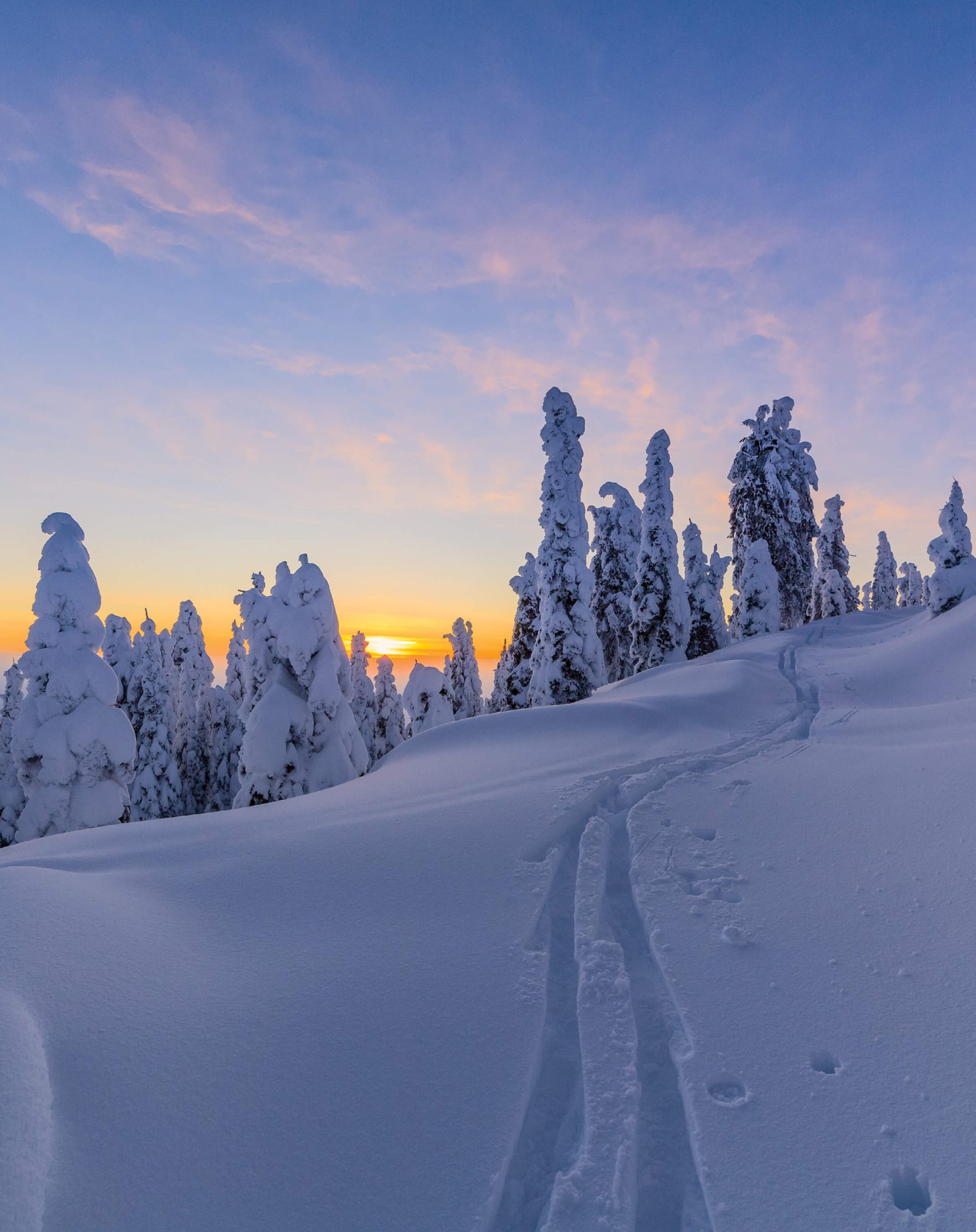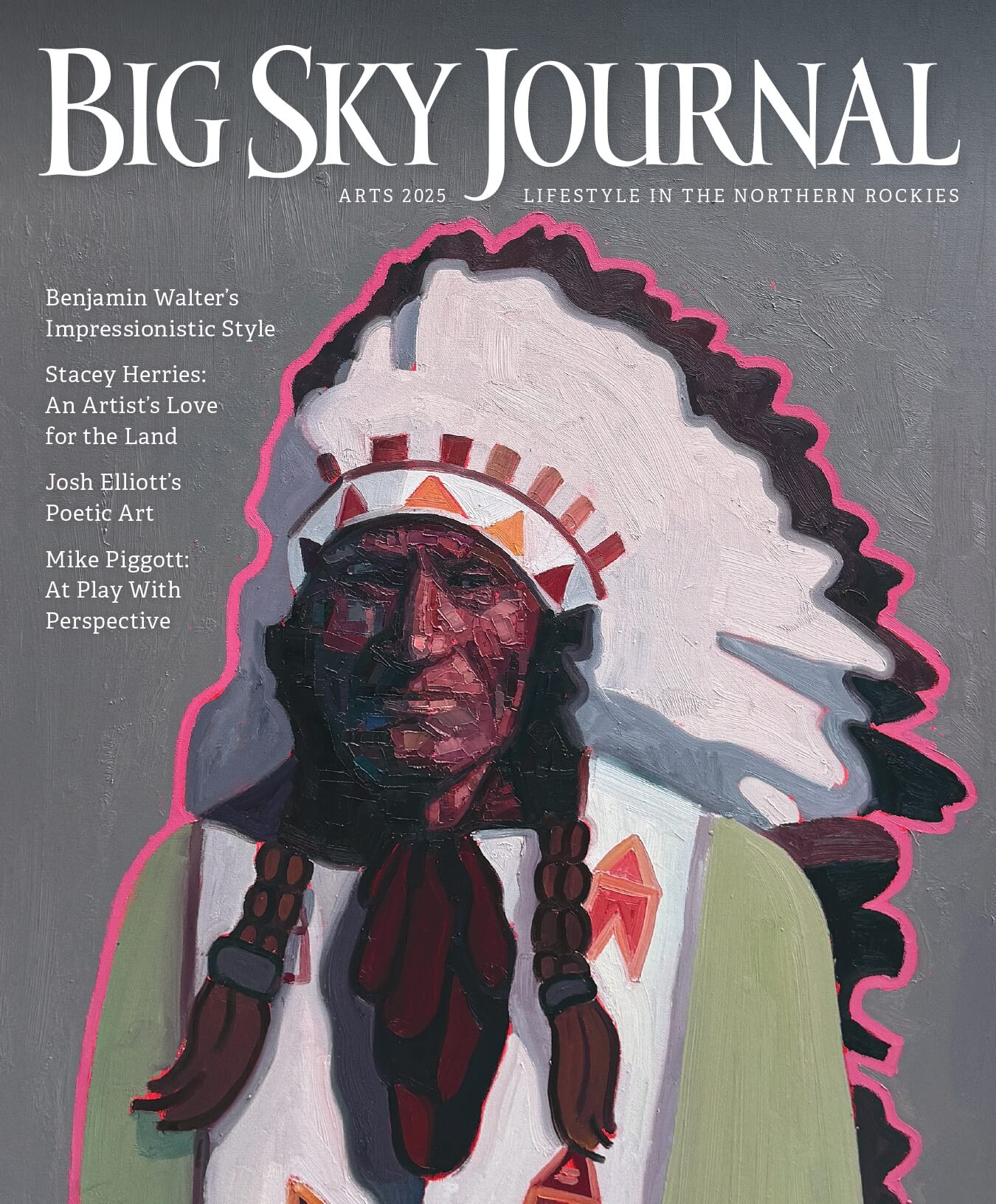
23 Nov Outside: Skinning Up
It’s 4:30 on a chilly morning in mid-February. The first floorboard in my bedroom is the loudest, and I carefully step over it, knowing that each creak and groan threatens to wake my dad and stepmom. At my mom’s house, I don’t have to worry about waking her; she’s almost always waiting outside my room with a thermos of hot tea for me. My cat Pippa watches as I pull on long underwear, a fleece top, and wool socks.
Downstairs, the fire in the woodstove — still bright with red and orange sparks — faintly illuminates the kitchen, throwing shadows along the walls. I slide each foot across the soft cork flooring, moving toward the breakfast I’d left out the night before: an orange and a bottle of water. Written in black ink on the orange is a note from my dad: “Way to go, Hopalong!” His childhood nickname for me still prompts a smile.
I slip the orange and water bottle into my backpack and head out into the cold. The snow crackles under my boots as I make my way to my 1996 Subaru — a family legacy passed down from my parents to my brother and, finally, to me, the youngest. The stars are still shining brightly overhead, and the street noises are muffled by fresh snowfall.
“Waiting On a Call” by Futurebirds plays as I drive down the deserted Main Street of Red Lodge, Montana. It’s a song a friend introduced me to, and I can’t stop playing it on repeat. I turn up the volume and focus on the curvy road that leads to our local ski mountain.
Red Lodge sits at the base of the Beartooth Mountains, and its population of around 2,000 makes for a close-knit community. When I walk into the local IGA, I almost always run into someone who asks how my family is doing.
I was born here in 2003, and I worry about the environmental and community changes I’ve already witnessed in my brief 18 years of life. Recently, I’ve heard about skyrocketing rents, houses being sold for millions, out-of-staters buying up properties to develop, new storage units being built just outside of town, and locals having to move away due to rising costs.
Stepping out of my warm car into the frigid mountain air is the hardest part of my day. I watch the lights from two snowplows carving their way through the parking lot, and the ski lodge stands dark and empty. I pull my skins apart and align the sticky sides to the bottoms of each ski. With fur-like material that creates traction, these will allow me to glide straight uphill on the snow. I pull on my backpack and trek toward a freshly groomed run to begin my journey.
The sound of my skis skimming over the crunchy snow, one after the other, creates a steady rhythm, as my poles dig in with each stride. Since my headlamp sits forgotten on my dresser, the only light I have comes from the moon, the stars, and the faint glow of a snowcat grooming a run further up the mountain. The individual snowflakes sparkle in the moonlight. Blood pumping with each stride, my body heat contrasts sharply with the brisk air, and my arms prickle from exertion.
Forty-five minutes later, at the top, I fling my pack down, pop my skis off, and roll up my skins, carefully tucking them away. I sit to catch my breath; with each inhale, icy air stings my throat, and my exhales turn into clouds of white. I breathe in my surroundings for a few moments. The hike up is straining, but the sense of accomplishment is electrifying. I gaze out over the ski lodge, past the town lights, and all the way to the edge of the horizon. Emotionally and physically, I’m on top of the world.
But then I start to worry. There’s been talk about opening the Beartooth Range to fracking. It’s disturbing to imagine drill rigs on the national forest land I’m admiring in the distance.
I peel the orange, devour it, and chug some cold water. Switching my bindings into downhill mode, I click my boots in, loop my hands through the pole straps, and start skiing down. I feel like I’m floating and my guide is the treeline, which creates a heavier darkness to my right. Fresh powder stings my face as I carve long arcing turns, cutting into the snow like a knife. Within no time, I’m at the base area again. Almost an hour of uphill effort creates a few minutes of pure freedom and an almost worry-free emptiness.
Back at the house, I rush into the shower and wash away the sweat. The hot water tingles my frozen fingers and toes. I get dressed, scratch Pippa’s ears, and head out the door again.
On the way to my car, I look over my shoulder at our old garage and think about the beehive that sits inside. My dad has kept bees for the past 25 years. I remember a time when I was about 5, and my small hands clutched the railing as I climbed the steep wooden staircase into the garage’s attic. My dad wore a white bee suit that matched mine, and we both had propolis stains on our fingers. A sweet, dusty scent filled my nostrils as I held the smoker, keeping the bees calm while my dad brushed them from the comb. I stuck my finger into the waxy pods and they released a warm glob of honey.
The memory is sweet, but then I start to worry about the fact that, each year, beekeepers are losing 25 to 30 percent of their hives. Keeping a hive alive for more than a year is a challenge. And considering that humans rely on honeybees to pollinate 90 percent of the world’s food crops, I don’t understand why everyone isn’t worried about this.
I take a seat in the high school classroom. It’s loud, hot, and crowded, but the mountain is still with me. In environmental science class, we’re learning about overpopulation and pollution. Every place will be different in the coming years; our small town and local ski area is only one small part of that.
I put in my earbuds and try to bring myself back to the feeling of gliding on my skis with a stark white field of snow in front of me, empty like the blank page that sits on my desk.
It’s September now, and the floating emptiness I experienced out on the mountain feels like someone else’s life. During the last few months of my junior year, the schools were shut down due to Covid, and it erased my senior year altogether.
As a freshman in college, I’m now facing decisions that will change my entire life. It’s exciting and overwhelming, scary and sad. I left my hometown, determined to get out into the world and learn more about the environment and the impact we have on it.
But what haunts me the most is how the small town of Red Lodge — my entire childhood world — might be changing while I’m gone. Who will be there to worry about the land? Who will watch the transformation of my community and the landscape that surrounds it? Who will hold that blank white slope as dearly as I do?
Sylvie Poore grew up in Red Lodge, Montana and, at times, southern Greece. In both places, she hiked and explored, learning to love nature and the outdoors. She spent last summer guiding at a ranch in northern New Mexico and is currently a freshman studying literature in North Wales.




No Comments